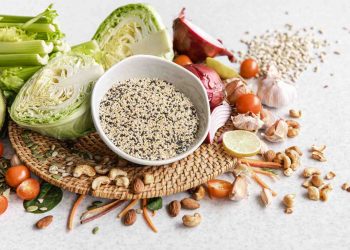Did you know that what you eat can significantly affect your brain’s performance? Just like your car runs better on high-quality fuel, your brain thrives on specific nutrients. If you’ve ever found yourself struggling to focus during a long meeting or feeling foggy while studying, your diet might be to blame. Let’s dive into five superfoods that can help sharpen your mental clarity and enhance your focus naturally.
Contents
1. Blueberries: Tiny Powerhouses of Antioxidants
Why They Work
Blueberries are often touted as one of the top superfoods for brain health. They’re packed with antioxidants, particularly flavonoids, which have been shown to improve communication between brain cells. A study published in Frontiers in Nutrition found that regular blueberry consumption is linked to improved cognitive function and memory in older adults (Kalt, 2020).
Pros and Cons
Pros:
- High in antioxidants, which combat oxidative stress.
- Easy to incorporate into your diet—add them to smoothies, yogurt, or just eat them as a snack.
Cons:
- Fresh blueberries can be seasonal and sometimes expensive.
- They can spoil quickly, so it’s best to consume them promptly.
Personal Note
I’ve noticed that whenever I snack on blueberries while studying, I seem to remember details more vividly. It’s like my brain gets a little boost!
2. Fatty Fish: Omega-3 Rich Wonders
Why They Work
Fatty fish, such as salmon, mackerel, and sardines, are rich in omega-3 fatty acids, which are crucial for brain health. Research indicates that omega-3s can enhance memory and cognitive function. A study published in the Journal of Alzheimer’s Disease found that higher omega-3 levels were associated with better cognitive performance (Yurko-Mauro et al., 2010).
Pros and Cons
Pros:
- Omega-3s have anti-inflammatory properties and can help reduce the risk of neurodegenerative diseases.
- They’re also beneficial for heart health.
Cons:
- Fish can be high in mercury, so it’s essential to choose sustainably sourced options.
- Some people may be allergic to fish or dislike its taste.
Personal Note
I love making a quick salmon salad with avocado and spinach. Not only is it delicious, but I can feel my brain firing on all cylinders afterward.
3. Dark Chocolate: The Sweet Brain Booster
Why It Works
Good news for chocolate lovers! Dark chocolate contains flavonoids, caffeine, and antioxidants, all of which can improve brain function. A study published in Frontiers in Nutrition noted that dark chocolate can enhance cognitive performance and mood (Smit et al., 2004).
Pros and Cons
Pros:
- Can improve mood and reduce stress levels.
- Contains essential minerals like iron and magnesium.
Cons:
- High in calories and sugar, so moderation is key.
- Not all chocolate is created equal; look for at least 70% cocoa content for maximum benefits.
Personal Note
Whenever I have a piece of dark chocolate during an afternoon slump, it feels like a little treat that gives me a much-needed mental boost.
4. Broccoli: The Green Brain Food
Why It Works
Broccoli is a cruciferous vegetable rich in antioxidants and vitamin K, which has been linked to improved cognitive function. A review in Nutrients suggests that vitamin K plays a role in enhancing brainpower (Kumar et al., 2021).
Pros and Cons
Pros:
- High in fiber and low in calories, making it a great addition to any meal.
- Contains compounds that may help protect against neurodegenerative diseases.
Cons:
- Some people find broccoli hard to digest or dislike its taste.
- Cooking methods can impact its nutrient content; steaming is usually best.
Personal Note
I often roast broccoli with olive oil and garlic as a side dish. It’s simple, tasty, and I feel good knowing I’m fueling my brain.
5. Walnuts: Brain-Shaped and Brain-Boosting
Why They Work
Walnuts are unique among nuts due to their high levels of DHA, a type of omega-3 fatty acid. Research has shown that consuming walnuts can improve cognitive function. A study found that walnut consumption is linked to better cognitive performance in older adults (Gonzalez et al., 2018).
Pros and Cons
Pros:
- They’re a great snack on their own or can be added to salads, oatmeal, or baked goods.
- Rich in antioxidants and healthy fats.
Cons:
- High in calories, so portion control is important.
- Some people may have nut allergies.
Personal Note
I keep a jar of walnuts on my desk for those moments when I need a quick brain boost. They’re crunchy, satisfying, and make for a perfect study snack.
FAQs
1. Can I get the same benefits from supplements?
While supplements can help, whole foods offer a range of nutrients that work synergistically for brain health. Always consult a healthcare provider before starting any new supplement regimen.
2. How often should I eat these superfoods?
Incorporating these superfoods into your diet a few times a week can be beneficial. Aim for a variety to maximize the nutrients you’re getting.
3. Are there any downsides to consuming these foods?
Most of these foods are safe for most people, but it’s essential to consider allergies, dietary restrictions, and any personal health conditions.
4. Can these foods help with specific conditions like ADHD?
While some studies suggest certain foods may help with focus and cognitive function, they should not replace professional treatment for conditions like ADHD. Always consult a healthcare provider for tailored advice.
Conclusion
Eating for brain health doesn’t have to be complicated. Incorporating superfoods like blueberries, fatty fish, dark chocolate, broccoli, and walnuts can make a substantial difference in your focus and cognitive function. Remember, though, that a balanced diet, regular exercise, and good sleep are all crucial for optimal brain health. So, the next time you feel your focus waning, try reaching for one of these superfoods instead of that sugary snack. Your brain will thank you!
This article is for educational purposes only and is not a substitute for professional medical advice. Always consult a qualified healthcare provider before making changes to your health routine.
References
-
Kalt, W. (2020). Blueberry supplementation and cognitive performance in older adults: A review. Frontiers in Nutrition. https://www.frontiersin.org/articles/10.3389/fnut.2020.00008/full
-
Yurko-Mauro, K., et al. (2010). Beneficial effects of docosahexaenoic acid on cognition in age-related cognitive decline. Journal of Alzheimer’s Disease. https://content.iospress.com/articles/journal-of-alzheimers-disease/jad090482
-
Gonzalez, J. T., et al. (2018). Walnut consumption and cognitive performance in older adults: A cross-sectional study. Nutrients. https://www.mdpi.com/2072-6643/10/3/354
-
Smit, H. J., et al. (2004). The effects of cocoa flavanol on cognitive performance. Frontiers in Nutrition. https://www.frontiersin.org/articles/10.3389/fnut.2021.00022/full
-
Kumar, V., et al. (2021). The role of vitamin K in cognitive function: A systematic review. Nutrients. https://www.mdpi.com/2072-6643/13/2/628
Get Your FREE Natural Health Guide!
Subscribe now and receive our exclusive ebook packed with natural health tips, practical wellness advice, and easy lifestyle changes — delivered straight to your inbox.














